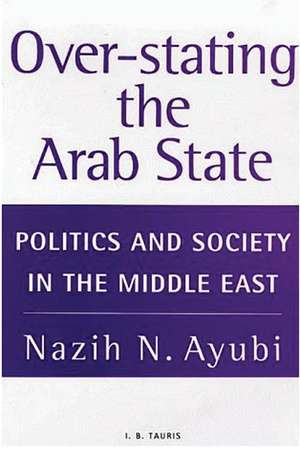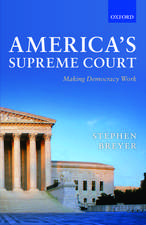Over-stating the Arab State: Politics and Society in the Middle East
Autor Nazih N. Ayubien Limba Engleză Paperback – 22 noi 2005
Preț: 225.26 lei
Preț vechi: 263.76 lei
-15% Nou
Puncte Express: 338
Preț estimativ în valută:
43.11€ • 44.53$ • 35.88£
43.11€ • 44.53$ • 35.88£
Carte tipărită la comandă
Livrare economică 25 martie-08 aprilie
Preluare comenzi: 021 569.72.76
Specificații
ISBN-13: 9781850438281
ISBN-10: 1850438285
Pagini: 528
Dimensiuni: 156 x 234 x 39 mm
Greutate: 0.72 kg
Ediția:Nouă
Editura: Bloomsbury Publishing
Colecția I.B.Tauris
Locul publicării:London, United Kingdom
ISBN-10: 1850438285
Pagini: 528
Dimensiuni: 156 x 234 x 39 mm
Greutate: 0.72 kg
Ediția:Nouă
Editura: Bloomsbury Publishing
Colecția I.B.Tauris
Locul publicării:London, United Kingdom
Cuprins
Part 1 The Middle East and the state debate - a conceptual framework: the state debate; the state in comparative perspective; the non-individualistic path to the state; the Arabs and the issue of the state; schematic argument and conceptual framework. Part 2 Modes of production and the origins of the Arabo-Islamic state: modes of production and social formations; the ancient Near-Eastern state and the "Asiatic mode of production"; early Islamic Arabia and the nomadic/conquestal mode of production; the Umayyads and the lineage/"iqta'i" symbiosis; the Abbasids and the "iqta'i"/mercantile symbiosis; the Ottomans and the military/"iqta'i" symbiosis; the articulation of modes of production in the historical Arabo-Islamic state; politics and ideology in the historical Arabo-Islamic state. Part 3 State formation in the modern era - the colonial/indigenous mix: the European encroachment; a colonial mode of production?; state formation in Egypt; state formation in the Levant; state formation in North Africa; state formation in Arabia and the Gulf. Part 4 The Arab state - territorial or pan-Arabist?: the pan-Arabist ideology; pan-Arabism and the "state"; the regional/functional approach; the "missing bourgeoisie" and the future of Arab unity. Part 5 The sociology of articulated modes - community, class and polity: political culture or political economy?; social correlates of articulated modes; a closer look at social class; corporatism and state - society relations. Part 6 The political system of articulated forms - the radical, populist republics: socialism or "elatisme"?; corporatist devices - macro and micro; Arab populisms in comparative perspective. Part 7 The political system of articulated forms - the conservative, kin-ordered monarchies: rentier economies, rentier states; politics and ideology - the kinship/religion symbiosis; "political tribalism" - or corporatism Gulf-style. Part 8 Civil-military relations: causes for military intervention; explaining the decline in coups; the radical republics and the military-industrial complex; the conservative monarchies and the military-tribal complex. Part 9 Bureaucratic growth - development versus control: expansion in the economic role of the state; bureaucratic growth in the Arab countries; explaining the expansion; the control functions of Arab bureaucracies. Part 10 Economic liberalization and privatization - is the Arab state contracting?: modalities or privatization; domestic versus international stimuli; country cases; Arab liberalizations in comparative perspective; the politics of economic adjustment. Part 11 Prospects for democracy - is the civil society striking back?: cultural and intellectual requisites for democracy; socio-economic requisites for democracy; political correlates of economic liberalization; country cases; the Yemeni adventure; public/private, civil/civic. Part 12 Conclusion - the "strong", the "hard" and the "fierce".
















